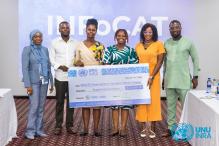In this workshop, UNU-FLORES and K-eco share information & knowledge on the development of nexus resource circulation of waste batteries between Germany and Korea with Korean researchers and partners through the final results of the third consultancy project, NABATE. This workshop is a follow-up to the international workshop held in Germany on December 7, 2023, and previously discussed topics will also be included in this event.
Through this workshop, the two organizations expect to have meaningful discussions on finding solutions for establishing and developing an internationally harmonized waste battery resource circulation system to promote an eco-friendly transition to e-mobility and establish a sustainable and integrated EOL EV battery recycling strategy in Korea.
Background
End-of life Battery volumes will be increasing drastically over the next 20 years, and batteries from electric vehicles will contribute a growing part to this battery waste stream. The must be a paradigm shift towards viewing end-of-life batteries not only as waste, but as a valuable resource. This includes both potential re-use options (“second-life”) and recycling. From a sustainability perspective, it is meaningful to first re-use and only then recycle batteries. However, vehicle batteries are not optimized for other purposes (such as stationary storage systems), and the re-use of end-of life batteries from electric vehicles is only attractive if their state-of-health is properly documented and their cost is substantially lower than that of new cells.
The battery recycling sector in Germany is rapidly expanding, with the key players being automotive manufacturers (including the major German car makers), (mostly international) battery producers, major German and international recycling companies, and a significant number of start-up companies specializing in battery recycling.
Despite a constant growth in recycling capacities, there have also been several setbacks. In particular, protests by local population have led to delays and even cancellations of several planned recycling facilities. This underlines the importance of clear communication and dialogue between corporate investors / implementers, decision-makers and the local population to ensure public acceptance. There is limited knowledge among the general public regarding battery and recycling technology, but also wide-spread fears about potential environmental contamination. Public fears are currently not substantiated by any governmental or scientific reports on environmental pollution due to recycling. However, a small number of fire incidents in recycling facilities has created negative media coverage and fuelled concerns, particularly among local citizens.
From a regulatory perspective, the most prominent advance has been the introduction of the new EU Battery Regulation, which sets future standards for collection, recycling and material recovery targets. The regulation aims at a circular battery sector, explicitly foreseeing the reuse of raw materials of strategic relevance within the EU. Plans for introducing battery passports, even though still under development with regard to some details, may be the most innovative feature of the battery regulation, as it may greatly facilitate battery recycling in the future.
Research and Development is advancing rapidly, both among global battery manufacturers and in the recycling industry. Further progress is needed in the context of dismantling and recycling processes, including further automation and enhanced efficiency both regarding resource use (e.g., energy) and recovery (e.g., lithium or cobalt). Besides the EU Battery Regulation, there is a wide range of national laws related to raw materials, (extended) producer responsibility, sustainable supply chains, waste and recycling, that at least partially relate to EV batteries. At the same time, many only some legal documents explicitly address EV batteries whereas others more generally relate to different types of batteries. Import and export of used and EOL batteries need further regulations to avoid burden shifting and environmental hazards to the destination country and loss of scarce resources. Clear definitions of responsibility of the different stakeholders throughout the value chain is required.
Background
South Korea and Germany are among the world’s leading producers of vehicles (3.46 and 3.31 million produced vehicles in 2021; OICA 2021), and both are characterized by significant domestic car markets as well as a strong export orientation (Eurostat 2022). Both countries have defined strategies to phase out internal combustion engines, completely replacing them by electric vehicles by 2035 (Yonhap News 2022; ADAC 2023). This transition will result in a constant increase in electric vehicle (EV) fleets, and in a medium-term perspective, a strong increase in the amounts of end-of-life (EOL) batteries. Germany and Korea have combined domestic car sales of approx. 5 million passenger vehicles per year. Assuming an average battery life of 8 to 10 years, in the 2030s, the two countries will have hundreds of thousands (and later over a million) EOL EV batteries annually. Even though both countries are important exporters of used vehicles, South Korea and Germany will need to establish significant capacities for battery recycling and disposal (and potentially, for reuse of batteries).
In South Korea, K-Eco in cooperation with private companies has set up a scheme for the collection, re-purposing, and recycling of EOL batteries from electric vehicles, and the country can be considered a pioneer in this field (e.g., KEI 2017). In Germany, several battery recycling plants have recently started operation, or are in preparation, with a wide range of operators (Battery News 2023). At the same time, citizens’ initiatives in several locations oppose the planned recycling plants, fearing negative impacts on the local environment. This explicitly includes the recycling plant that was planned by SungEel HiTech in Rudolstadt, Thuringia which has been brought to a complete halt by local protests (MDR 2023). At the same time, increased battery recycling capacities are strongly needed. While citizens’ concerns should be taken seriously, some are unfounded fears and communication strategies should therefore address the need and benefits of battery recycling as well as high safety and environmental standards.



